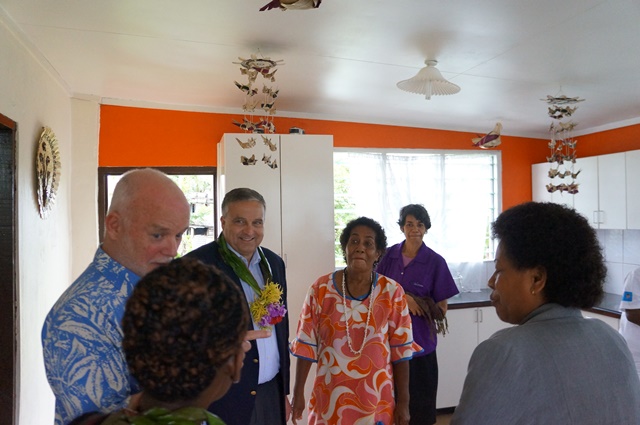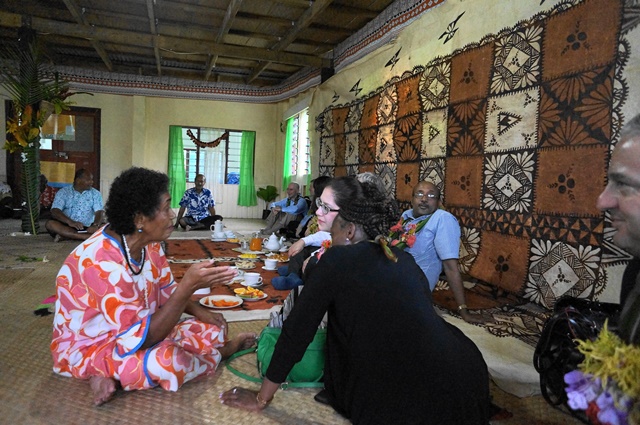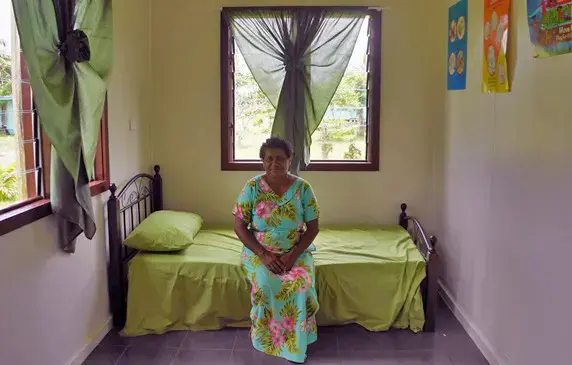For the majority of the her life, Melaia Nabukavou lived in Suva City during which time she joined one of the first organized body for indigenous women, the Soqosoqo Vakamarama; until 2008 that is when she decided to return to her village in Naduru, Kuku in Tailevu.
The 66-year-old settled into village life and her previous involvement with social work tagged at her heart strings: she knew she wanted to be an active member of her community.

In no time, she was leading the women's church group and actively participated in the Naduru Women's Club, which as an entity was a collective for the village women" it was their space, in which they could discuss village obligations and issues which they could collectively address.
The comradery and discussions wove confidence into the group psyche that made them decide in 2010 to embark on a project which, as time has proven, would benefit both the women's club and Kuku as a whole: a communal kitchen to be attached to the community hall was the consensus.
For two years, the 70-member club consistently organized a fortnight voluntary collection, they were levied $10 and some weeks $5, dependent on how much they had had to do as a group during that two-week period; the idea was that in every month, two collections were made.
The vanua (traditional reference to a district, region or province) would also have a soli (monetary collection) to support the women's attempts; Nabukavou took over the presidency and approached the Nausori office of the Ministry for Social Welfare, Women and Poverty Alleviation for assistance.
The Naduru women would be advised if something came up so with whatever they had collected, construction of the kitchen began and when the ministry finally came around to offering a grant, the foundation, house frame and roof had been completed.
"The grant ensured the kitchen was completely properly. The five mataqali (clans) of the village were each asked for different cutleries, pots or pans and this way, we managed to fit out the kitchen," Nabukavou said.
"Village life means communal obligations which we do collectively; now the women had a kitchen from which we could cater for these gatherings; for a funeral or a wedding, we charge for the use of the kitchen," she explained with a grin.
The women's group also has a programme for handicraft. The Naduru Women's Club and the Naduru Youth group are considered by the chief, the Vunivalu (Naduru) and Tui Kuku, Ratu Manasa Kalounivutia platforms through which his village and district will roll-out development projects.
The women's kitchen is an extension from the village hall; attached to it is another extension which serves as the village wellness centre, a United Nations Population Fund-funded project, initiated and successfully implemented by the village youth group. By the time the United Nations Development Programme (UNDP)/United Nations Population Fund (UNFPA)/United Nations Office for Project Services (UNOPS) executive board came to Fiji in 2014, Kuku was showcased as a United Nations initiative where its integrated nature ensured services and information could be accessed by anyone, for miles around.
UNFPA Pacific Sub-Regional Office Assistant Representative Virisila Raitamata said Kuku was exemplary of community initiatives becoming a success because of co-operation within the villagers themselves.
"I would also say that the strong leadership, both in terms of the traditional and faith-based, means the women's club and the youth group receive the encouragement and guidance they need but their own roles in the project are not taken away from them," Raitamata said.
During the executive board tour of the complex, Nabukavou was not shy when the group reached the kitchen, advocating strongly for the completion of the kitchen to the board chair at the time, Fiji's Permanent Representative to the United Nations Ambassador Peter Thomson.
The rest is history as they say; UNFPA Pacific complemented the kitchen with a fridge and stove. "It is now a complete unit that has allowed us to dream alittle more," Nabukavou said, discussing how the women's group intended to lobby the local schools to supply lunches for students, for example.

It is a fact that when a nation invests in girls, adolescents and women, the multiple benefits can be the tipping point for a family and community's progress; such trends are then reflected at national level.
International Conference on Population and Development (ICPD) High-Level Task Force member and development economist Professor Gita Sen recently spoke in Fiji of the critical importance of ensuring that gender justice was at the heart of development initiatives.
"When they say we want the right to development but don't give us all those human rights stuff... it puts women between a rock and a hard place; the right to development must be inclusive of all other rights," Professor Sen said.
The UNFPA Pacific Director and Representative Dr Laurent Zessler said as an organization, the UNFPA Pacific was proud to be associated with such initiatives.
"The UNFPA Pacific works with Governments and Civil Society, in particular the media and certain partnerships with the private sector but at the end of the day, the story of Kuku is an example of how we do want to see that our collaborations, even at policy level, trickles down to ordinary people," Dr Zessler said.
"The initiative of economically empowering women in this way will have a rippling multifaceted effect and studies have showed that women who are given assistance like this, are productive and when they reach a certain level of success, they normally reinvest in family members and communities, even before themselves."



